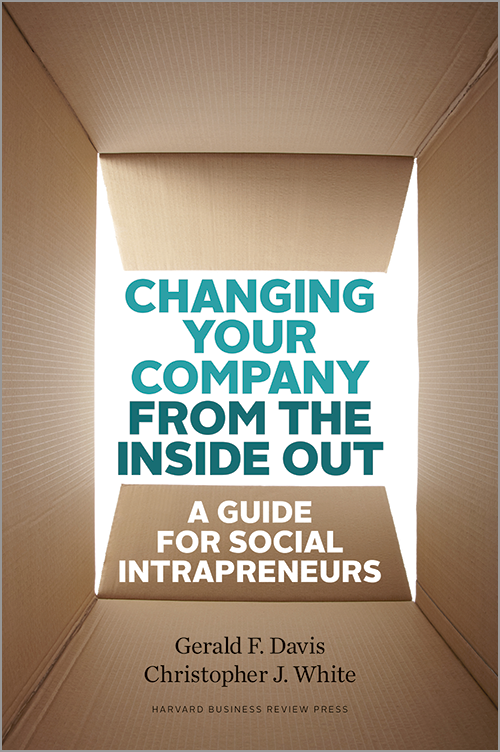Changing Your Company from the Inside Out: A Guide for Social Intrapreneurs
March 26, 2015
If corporations truly are people, then like all people it benefits us as a society if they're committed to making a social profit as well as a financial profit.

Changing Your Company from the Inside Out: A Guide for Social Intrapreneurs by Gerald F. Davis and Christopher J. White, Harvard Business Review Press, 224 pages, $28.00, Hardcover, March 2015, ISBN 9781422185094
Regardless of how you feel about the issue of corporate personhood, corporations are largely a manifestation of the people who work within them. But many people feel that corporations are motivated only by the bottom line and the demands of the market, rather than driven by any human values. So, when idealistic college students leave their campuses and start looking for jobs that match their desire to change the world through their good works, the reality of available opportunities to make change can be sobering. Many of our fiercest believers in doing good then opt for careers outside of traditional corporations, when their vision and infectious energy is needed to challenge the status quo and keep those companies adapting to social change.
In Changing Your Company from the Inside Out, Gerald Davis and Christopher White offer a blueprint for how “intrapreneurs” can move the needle while working in a system. The authors assert that corporations don’t need to operate outside or aside from concern for the social good, but acknowledge it can be hard for the “grassroots social innovations” to reach the decision makers with a proverbial "sky view" of a for-profit business.
Many companies are overflowing with grassroots social innovations, ideas for products or practices that serve business purposes while making a social contribution. Yet these initiatives are often smothered in the crib. Even successful intrapreneurs often find themselves swimming against the tide of organizational culture.
There is certainly a lot of blame to go around when critics take corporations to task for not doing their social duty, and it’s a challenge to make big decisions based on social values rather than, say, market data. But those two forces should line up when looked at over the longer-term. Davis and White use SC Johnson (one of our fellow Wisconsin companies) to explain just how precarious, yet important, it can be for companies to make a values-based decision.
SC Johnson, committed to removing chloride from all of its products, was faced with a dilemma when their popular Saran Wrap product performed poorly with the new chemical equation. The company stayed true to their commitment, removed the chloride, and quickly lost a hunk of market share. Was it worth it? In the most recent Harvard Business Review, CEO Fisk Johnson shares his belief that, “Trustworthiness is the most important quality a company can have, and it must be earned.” How better to gain trust and earn customers over the long term than to help look out for what is most important for the people who buy your product: their health.
The minute that inspired employees stop bringing in ideas like these to work and stop trying to gain traction on what they believe in is really detrimental to the company as a whole, because it represses the potential to align company values with social value in an era in which social conscience matters. But it is the company's job, Davis and White believe, to foster an environment in which these ideas are welcomed: “How open the political system is shapes how easy it is to advocate for innovation.”
But employees must also be mindful of how they frame the issue they are proposing, as “the single most important tactic used by issue sellers is adapting their message to the audience they are approaching.” An assumption might be made that promoting women-centric initiatives is easier at Avon than at Goldman Sachs, but both organizations have strong programs to advance women despite their traditionally different customer demographics. For Avon, the brand itself is supported by and for women; Goldman Sachs took on an initiative because it presented the possibility of growth into less traditional markets. As the authors say:
Frames that resonate within organizations typically reflect the corporate culture: the DNA of shared meanings, assumptions, and stories that shape how people understand the organization and its purpose.
What may not seem like a natural fit for a corporation may actually apply if the proposal orients toward what is important to company leaders.
Changing Your Company from the Inside Out began as an MBA course to “teach business students how to be effective change agents from within the corporate world.” And its own social purpose will certainly be a benefit for business if those organizations attract and keep young and motivated employees inspired to make change. As Davis and White conclude:
Significant changes often do not stay bottled up in organizations, but spread from company to company through a kind of contagion process.
And, needless to say, if corporations truly are people, then like all people it benefits us as a society if they're committed to making a social profit as well as a financial profit. And if they don't, they will lose less talent to the non-profit sector.

